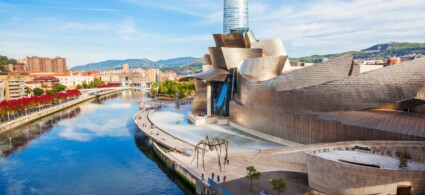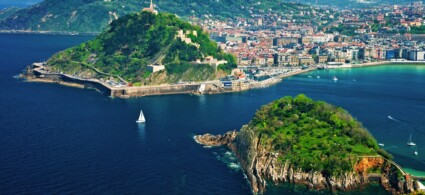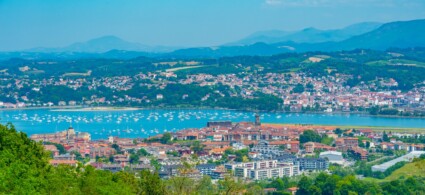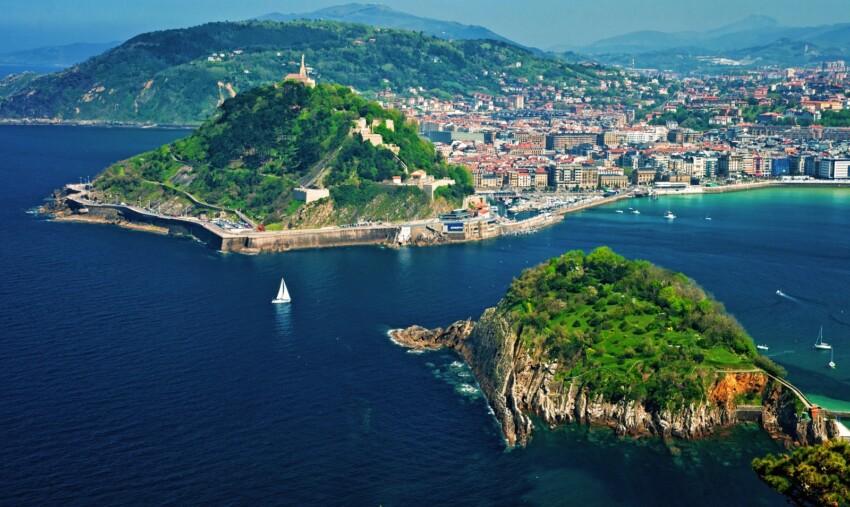

A small land with a proud temperament: the Basque Country (Euskal Herria in Basque) is Spain as you have yet to see it, but with all the history, natural beauty and good food for which everyone loves the Iberian nation. The sun-drenched beaches of the Costa del Sol, the postcard image with which Spain is often identified, give way to fertile hills and a rugged coastline on which picturesque bays surrounded by greenery open up here and there.
It is a land proud, almost jealous, of its millenary traditions and its very special language. The latter is a real riddle for linguists, who still have not defined its origins with certainty; Basque or Euskara is both totally incomprehensible and as magnetically fascinating as a siren’s song. This land strongly linked to its past is also one of the richest and most evolved areas in Spain, thanks to the tenacity and entrepreneurial spirit of its inhabitants.
A holiday in the Basque Country allows you to get to know a Spain that is different from the stereotype of sun and bullfighting. Here, cider is preferred to cerveza, tapas is called pintxo and ‘hola’ is called ‘Kaixo!’. But don’t worry: Castilian Spanish is also spoken, people love to have fun and party, and the local gastronomic tradition is mouth-watering.
Your travel plan can include visits to futuristic contemporary art museums or to picturesque villages and historic quarters, lazy afternoons at the beach, trekking along the Camino de Santiago and gorging on fish. Are you tempted?
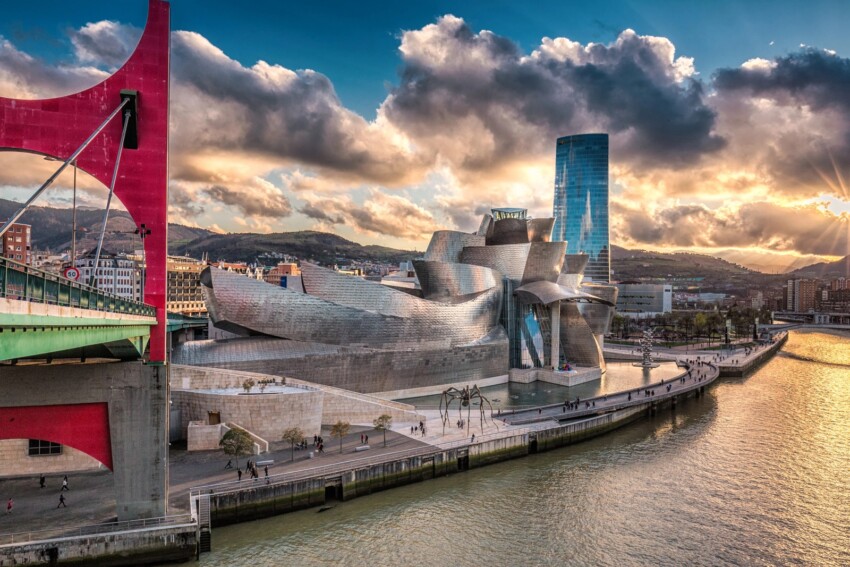
The two must-see cities on a trip to the Basque Country are San Sebastian (Donostia in Basque) and Bilbao (Bilbo), both of which are ideal as stops on a car tour or as weekend destinations.
San Sebastian is the quintessence of the Basque Country: a city that is both romantic and trendy, rising on a picturesque bay surrounded by green mountains and mixing characteristic old quarters with new modern areas with art galleries and entertainment for young people. Its city beaches are among the most beautiful in the world and San Sebastian can boast the best pintxos in the region.
Bilbao is a favourite destination for contemporary art lovers, home to one of the most famous and visited museums in the world: the Guggenheim Bilbao, housed in a futuristic building that has transformed the city’s image.
Spend some time also in the traditional villages, where you can discover the most authentic soul of this very special part of Spain. Zarauz and Deba are pretty towns along the route of the Camino de Santiago (Northern Way); to these you can add Guernica, the city devastated by bombing during the civil war that inspired Picasso’s masterpiece.
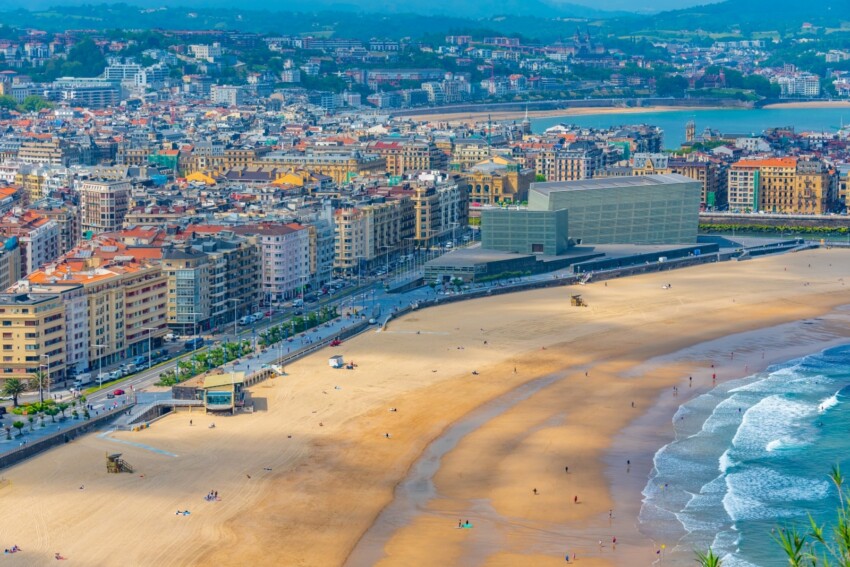
Despite being a coastal region, the Basque Country is not famous for its beach resorts. The beaches in the Basque Country are highly atmospheric, surrounded by beautiful natural scenery, but the water temperature is a little cold for the tastes of tourists, who prefer the beaches in the south of Spain for this reason.
If you want to try bathing, do so at the most beautiful beach in the Basque Country, La Concha in San Sebastian, which is also perfect for a romantic stroll.
For surfing enthusiasts, on the other hand, the Basque Country is a dream destination. Particularly recommended is the Gros area in San Sebastian, full of beaches where you can practice your favourite sport, shops where you can do some technical shopping and clubs where you can spend the evening, but all along the coast there are other beaches with ideal surfing conditions.
Given the particular climate of the Atlantic basin, the warmer summer months are recommended for a beach holiday in the Basque Country. Don’t hope for swimming in October.
Arriving in the Basque Country is very easy, as Bilbao, the largest and most important city in the region, has a modern and well-connected international airport, thanks mainly to Spanish low-cost airlines such as Volotea and Vueling, with direct flights departing from several European airports.
Land in Bilbao and rent a car right away and you will be in San Sebastian in an hour’s drive and in Vitoria in less than 45 minutes. The region’s main centres are also connected by a series of intercity buses, which depart from Bilbao and arrive at the Intermodal station, practically next to the San Mames stadium.
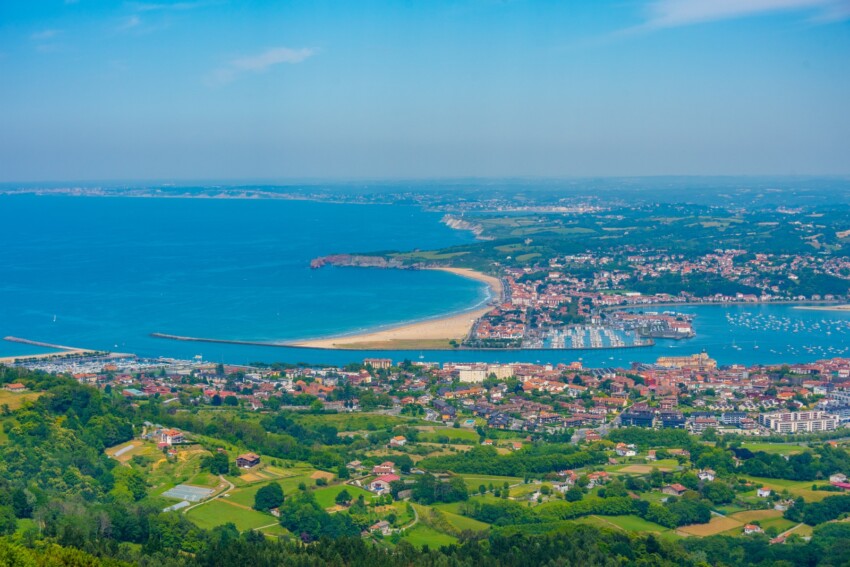
The alternatives for sleeping in the Basque Country are almost endless. However, we recommend sleeping in Bilbao if you plan to visit: the city is experiencing a real renaissance and is full of hotels and flats, both in the central area and in the area between the Guggenheim and the San Mames stadium. If, on the other hand, you are looking for a more relaxed atmosphere and a seaside resort with a magnificent beach, head without hesitation to San Sebastian. Very touristy, especially during the summer, this beautiful coastal city has a wide choice of hotels and places to stay, some of them very elegant and of a high standard.
But the Basque Country certainly doesn’t end here. If you’re looking for the typical atmosphere of this part of Spain, there’s nothing better than sleeping in one of the small coastal villages overlooking the Atlantic Ocean. Here, too, you will have good hotel accommodation, mainly due to the fact that this area is very popular with tourists during the summer.
The Basque Country is a region in northern Spain. It is bordered to the east by the region of Navarre and for a short distance by France, to the south by the region of La Rioja and Castile and León, and to the west by the region of Cantabria. On its northern side it is entirely washed by the Cantabrian Sea. It is one of the smallest regions in Spain, with less than 5% of the population living there, but is very important economically.
The region is divided into three provinces (Álava, Biscay and Guipúzcoa), while from a geographical point of view there are three areas delimited by the two parallel chains of the Basque Mountains:
The mountains in the Basque Country are not particularly high: the highest peak in the region reaches 1551 metres.
